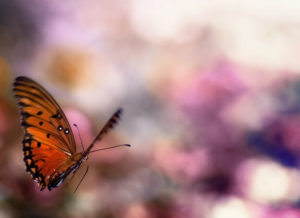This month, we’ll explore the ancient Japanese form called the tanka. This lesser known form might be thought of as haiku’s quiet older sibling.
What Makes a Tanka
Tanka was practiced in classical Japan as a form of linked verse. One poet would write a three-line poem of 17 syllables and give it to another poet. The second poet would add two more 7 syllable lines for a total of 5 lines and 31 syllables. The last two lines often provided a turn or counterpoint to the first three lines, much like the ending of a sonnet. The complete form, then, would look like:
5-7-5-7-7
You might recognize the 5-7-5 part of the tanka as the precursor to haiku!
Here’s a striking example of tanka, by Sadakichi Hartmann, from the early 20th century.
I.
Winter? Spring? Who knows?
White buds from the plumtrees wing
And mingle with the snows.
No blue skies these flowers bring,
Yet their fragrance augurs Spring.
In the 17th century, Basho developed haiku and brought the 17 syllable part of the tanka form to its highest level. His poems focus on the natural world and the passage of time.
Our Turn
Maybe the best way to understand the tanka is to try it. Here are three haiku: two by Basho the master, and one by me the eager student. Because they are haiku, they already contain a “turn,” but we’ll use them as our foundation anyway.
I come weary,
In search of an inn—
Ah! these wisteria flowers!
–by Matsuo Basho, translated by William George Aston
The old pond, aye!
And the sound of a frog
leaping into the water.
–by Matsuo Basho, translated by Basil Hall Chamberlain
West Hill clouds hang low,
caught up in fir branches,
a veil between two worlds.
–by Kortney Garrison
Take one (or all!) of these haiku and add two more 7 syllable lines to the three already given. Open up a conversation across the centuries through your poetry. Think about taking the poem in another direction or deepening the given theme. If you’d like to offer a haiku that you’ve written, I’d love to add a few lines. Let’s practice poetry as collaboration.
Photo by Nathalie, Creative Commons, via Flickr. Poems are in the public domain. Post by Kortney Garrison.
____________
Check out our patron-only publishing opportunities!
- Poetry Prompt: Fireworks, Sparkles & Speckles - July 2, 2018
- Writing Prompt: Science Fiction and Ecopoetry - June 25, 2018
- Poetry Prompt: Science Fiction with Ray Bradbury - June 18, 2018


lynn says
In response to Basho’s wisteria haiku:
purple blooms adorn doorway
scent welcomes traveler in
Kortney Garrison says
Of course this makes me think of the movie Enchanted April. Might need to watch it again even though the calendar has flipped over to May! Thank you for sharing these lines, Lynn.
Here’s mine:
I come weary,
In search of an inn–
Ah, these wisteria flowers
Mirroring the sky, blossoms
Flicker like a thousand stars.
lynn says
Lovely post, Kortney!
Katie says
In response to Basho’s pond haiku:
enough to startle a coy fish
making him jump out of the pond
Kortney Garrison says
Love this! As if the pond keeps a strict one in/one out policy!
Here’s mine:
The old pond, aye!
And the sound of a frog
Leaping into the water,
Her round belly full of eggs,
Another generation.
Katie says
Like your interpretation of my pond tanka:)
Your tanka is natural and simple yet deep.
Thank you, Kortney
Katie says
Kortney,
How about a tanka to celebrate “Reading in the Wild’s” 1st Birthday?
Read wild, self-select
plan for your reading, show your
preference, sharing
recommendations, sublime
dedicated reading time.
Kortney Garrison says
Writing poetry in celebration?! You’ve stolen my heart!
Katie says
🙂
Megan Willome says
Katie, what a great idea! Birthday poetry!
Katie says
Thank you, Megan.
Rick Maxson says
Nice introduction to the Tanka, Kortney.
Also adding to Basho’s haiku:
I come weary,
In search of an inn—
Ah! these wisteria flowers
have captured evening’s colors
and burnished them with moonlight!
Kortney Garrison says
Thanks, Rick. Your burnished moonlight is so rich.
Sandra Heska King says
The old pond, aye!
And the sound of a frog
leaping into the water.
The sight of a blue heron
banking on breakfast. Swim, frog!
Megan Willome says
Sandy, love, your Florida is showing. (And it’s delightful.)
Katie says
Yes, love it!
Sandra Heska King says
Thanks, Katie! 🙂
Katie says
Sandra,
Welcome:) Would you please do me a favor and let me know how I might improve my tanka in the other tanka post thread? It’s the last comment from May 17 I sent last night. It begins: “leaves of tree and grass…”
Katie
Sandra Heska King says
Just living life in King’s Wild Kingdom. 😉
And thanks, you two.
Sandra Heska King says
From my walk this morning..
red bottle-brushed sky
maroon plumes from the fountain
here I am–walking.
Sandra Heska King says
I want to take a mulligan on this one. 😉
Kortney Garrison says
Mulligans, revision, iterations, second looks–always welcome!
A few lines to go with your walk…
red bottle-brushed sky
maroon plumes from the fountain
here I am–walking.
each breath, each step a prayer:
aware, alive, awake, at peace.
Katie says
Kortney,
LOVE Sandra’s haiku turned tanka via you;)
Beautiful.
Sandra Heska King says
Well, you turned that into something quite peaceful. 🙂
Renee Bartovics says
Here is mine!
West Hill clouds hang low,
caught up in fir branches,
a veil between two worlds.
Far below, on Red Bird Lane
her steps falter, vailed in woe.
Renee Bartovics says
Misspelled!! veiled is the word!
Renee Bartovics says
Actually- the word vail is archaic but a real word and I have used it properly, I think! What are your thoughts?!
Katie says
Renee,
I think it’s a beautiful tanka, whichever way you spell vail/veil:)
Thank you for sharing it!
Kortney Garrison says
I love the interplay that happens–often unawares–when we open ourselves to language, the depth of meaning and history words carry. And I’m honored to have your lines next to mine; I want to know more about this woman and her woe!
Renee Bartovics says
What a nice comment! I love this form of word interplay!!! And your words are an inspiration to Me! Thanks!
lynn says
Fun to read these!
I’m thinking that “tanka” are usually written by one person and “tan renga” are collaborative, with one poet’s haiku and another’s response. So, maybe these are tan renga?
lynn says
Rick, I like your idea of moonlight…inspired me to edit my lines:
purple moon blooms in doorway
scent welcomes dream travelers
(and I linked to TS Poetry on my website: https://madhatterpoetry.com/2018/05/08/purple-dreams/)
Katie says
lynn,
I think they both work well – but do like the edit best:)
Lovely tanka!